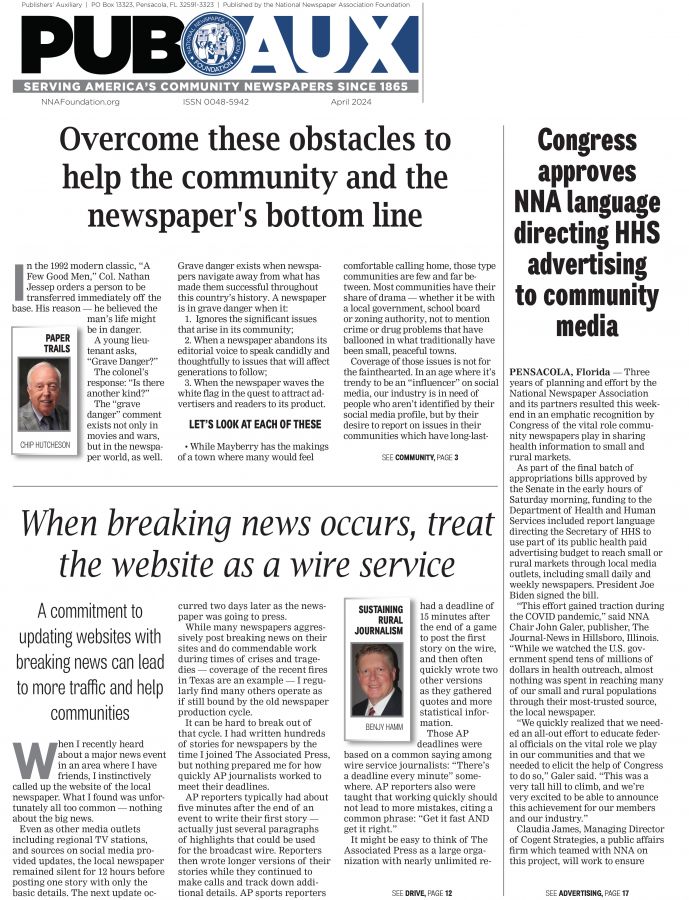Withholding public information creates double standard
Apr 11, 2014
By Jim Pumarlo
Everyday Ethics
A woman calls to say her son was whisked to the hospital for a routine matter. Must the ambulance run appear in the paper? It causes so many unnecessary phone calls.
Another woman asks that her shoplifting conviction not appear. Her mother is sickly, and, if she reads the court report, it may adversely affect her health.
Two people have lived together for quite some time and just now are applying for a marriage license—with the same address listed for each. Must the embarrassing news be printed?
A man has received a traffic ticket. He threatens to call his attorney and sue the paper if the fine is published.
All of these examples occurred during my tenure as editor of the Red Wing (MN) Republican Eagle. The answer to all four requests was: Yes, the information will be published. It was one policy on which the newspaper stood firm.
We made it clear that local officials were not to blame. They simply were conforming to state law by releasing the data.
We printed the information for several reasons.
Flexibility is the best posture. Editors should try to blend policies to best serve community needs. But public information should be sacred ground to newspapers. It should be to readers as well.
If editors bow to readers’ wishes—and they were able to eliminate publication of news at the ease of a phone call—imagine the vast incompleteness of reports. An entire newspaper’s content would become suspect.
Most news items, which raised questions, appeared in our public records section including marriages, divorces, court news, police and accident reports, ambulance runs and fire calls. The page was our daily record of community nuts and bolts. Along with news briefs, it provided a living history by its diversity of items.
Secondly, public agencies and officials furnished much of the information. It reflected how a good share of public tax dollars was spent.
News briefs also alerted residents. A broken window or tampered lock on a storage shed may seem minor at first glance. But if a repeated number of these appear in the same area during a short period, it warns homeowners. Failure to report the items, we believed, would be a great disservice.
The last reason may be the most significant. Newspapers cannot be judge and jury.
The information is public. As such, it should be newspapers’ obligation to print the news, even though people often have legitimate reasons for withholding the information.
Editors certainly understand the inconveniences that may occur, but they are in no position to judge one person’s argument to be more valid than someone else’s. You are on strongest ground if you treat everyone the same.
Over the years, our policy to publish ambulance runs likely received the most complaints. Problems occurred when we received an incomplete report. That was happening for a while as the Fire Department—unknown to us—honored any request to withhold a run. That created an obvious double standard. It was also unfair to those individuals who didn’t realize they could bypass the news with a simple request.
We connected with the fire chief. He explained that his department always was blamed for getting the news in the paper. He subsequently ordered his staff to report all the news, and refer anyone with questions to us.
The responsibility of publishing all “public” news works both ways. Many newspapers routinely publish arrest reports. They are public information.
However, some of the charges are dropped or changed through plea-bargaining. Newspapers should be just as diligent to print that side of the story. As courts release information, that should be published to set the record straight. © Jim Pumarlo 2014
Jim Pumarlo writes, speaks and provides training on community newsroom success strategies. He is author of “Journalism Primer: A Guide to Community News Coverage,” “Votes and Quotes: A Guide to Outstanding Election Coverage” and “Bad News and Good Judgment: A Guide to Reporting on Sensitive Issues in Small-Town Newspapers.” He can be reached at www.pumarlo.com and welcomes comments and questions at jim@pumarlo.com.







